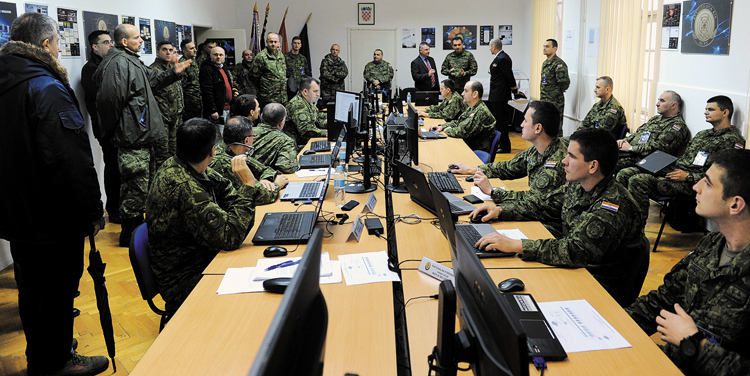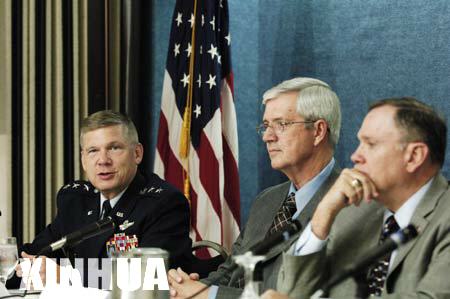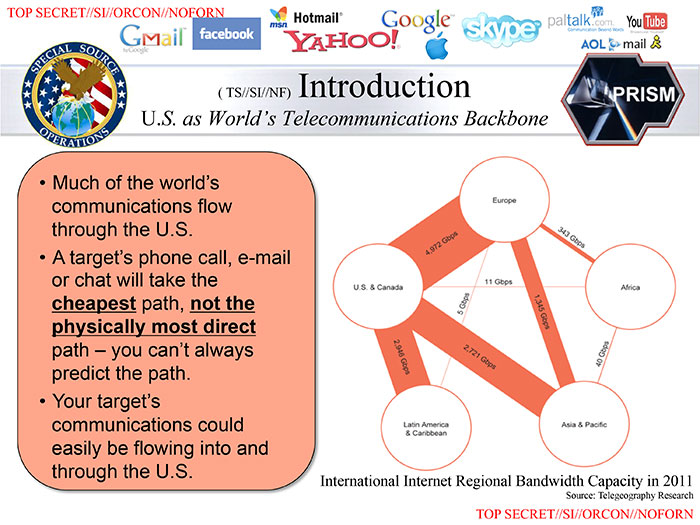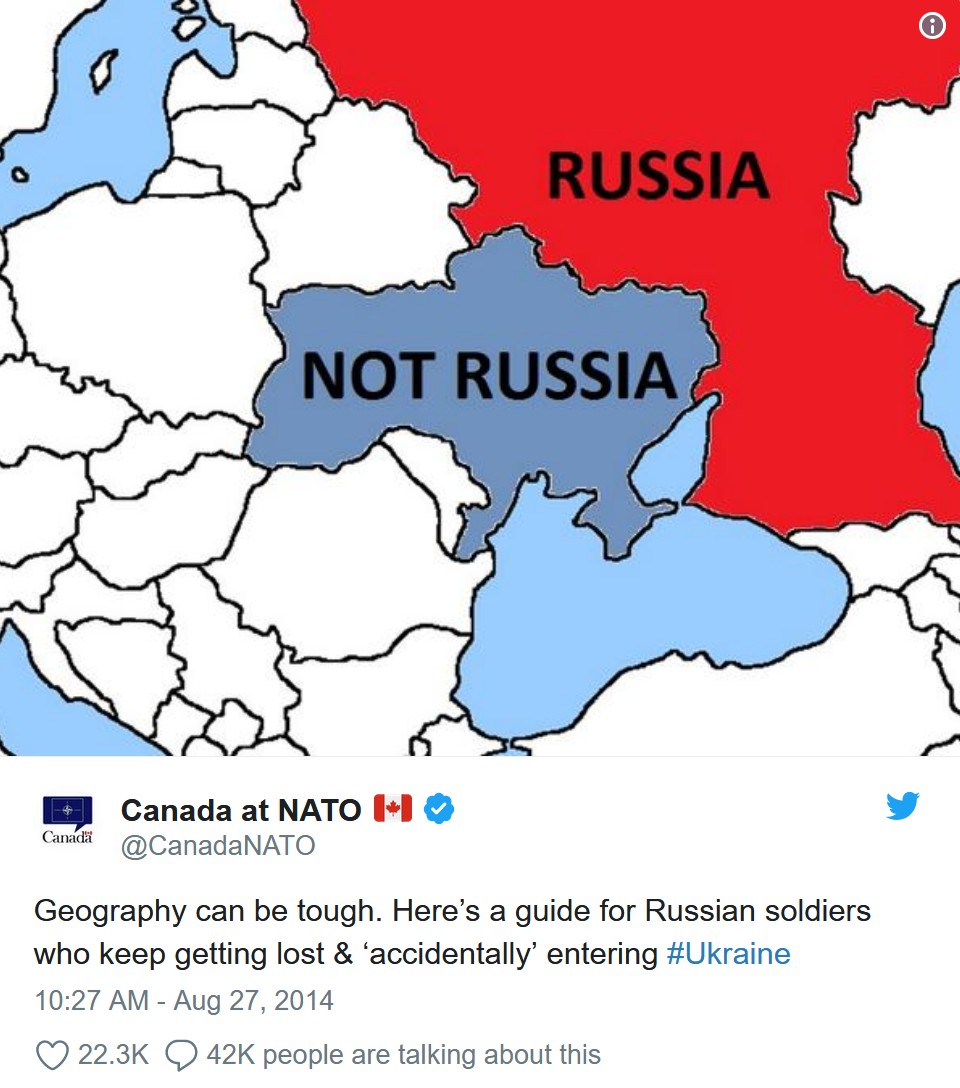Talk About Cyber Attacks and "Weaponization" of Social Media
NATO on Social Media --
The Threat to Liberal Democracy
It has become increasingly clear that the U.S.-led NATO aggressive alliance is directing the anti-democratic measures being taken in Canada and other NATO member countries to criminalize conscience and speech, in the name of defending democracy and national security. The assault on conscience and speech targets speech that opposes NATO and is critical of the political and electoral systems in the NATO member states. Combined, this represents a broad assault on freedom of conscience and speech and the struggles of the peoples to affirm their rights and for empowerment.
In October
2017, NATO's Parliamentary Assembly (NATO PA) issued a
report entitled "The Social Media Revolution: Political
and Security Implications." It was produced by the
Sub-Committee on Democratic Governance with Canadian
Senator Jane Cordy serving as rapporteur. The
Sub-Committee on Democratic Governance works under the
Committee on the Civil Dimension of Security. The aim of
the report is stated as being "to raise awareness and
launch a discussion among members on this emergent theme
and to offer some initial thoughts on ways to counter the
malicious use of social media."
The introduction to the report is about the rise in social media use. It states that the "dramatic transformation of information and communication technology" along with growing use of social media is "changing the way we look at security ... and demands innovative responses." Twitter and Facebook, the report says, "amplify the voices of and decrease the cost for people to connect more intimately and to communicate and organize among themselves and with their governments." The possibility of anonymous use of social media, "can embolden those who propagate hate speech as equally as those fighting against authoritarian regimes without fear of reprisal."
It speaks of the resulting "weaponization" of social media, summed up as follows: Social media "provides new opportunities for those who seek to disrupt the liberal democratic world order by using the intrinsic openness of the cyber domain." Social media is used by "terrorist organizations as a recruiting and propaganda tool." Social media is "exploited by states that seek to influence and undermine liberal democracies, their government institutions and their social fabric -- at times, to great effect."
The rest of the report is broken into the following
sections:
1) Social Media and Democratic Governance;
2) The 'Weaponization' of Social Media, a) Daesh and
Social Media, and b) Social Media as a Foreign Policy
Tool: The Case of Russia;
3) Responses to Social Media's Security Challenges; and
4) Conclusions.
Merging the Threat of Terrorism with "Foreign Influence"
Following the issuance of this report, NATO countries such as Canada have started to speak of the terrorist threat and the far from proven threat of "foreign influence in elections" as one and the same, the former causing "loss of life" and the latter "threaten[ing] to weaken and divide the Western world." By sleight of hand, the threat of terrorism and measures to counter it are merged with opposition to NATO, which is synonymous with opposition to war and to the elitist system called liberal democracy. The same security forces tasked with combating terrorism are being "re-tasked" to identify what are deemed to be "foreign influenced" opinions about NATO and democracy. A thought-control police has been empowered to attack the right to conscience of all human beings, with freedom of speech during and between elections the first casualty.
Social-Media Charged with Censorship Duties
Based on this faulty self-serving argument that opposition to NATO and a discredited electoral process are foreign-inspired and pose a danger to national security, the implementation of a system of censorship is being placed in the hands of social media mega-giants such as Facebook and Google. This places censorship outside of the public domain, beyond the reach of public mechanisms that are supposed to provide recourse to such an abuse of police powers. The "terms and conditions" of social media platforms define what they can or cannot do in terms of denial of service, removal of postings and blogs, etc. You either accept them or are deprived of their use.
On November 1, 2017, the social media monopolies Twitter, Facebook and Google testified in front of the U.S. House Intelligence Committee on allegations of the use of social media by "Russians" to interfere in the U.S. elections.
The day prior, October 31, 2017, the Judiciary Crime and Terrorism Subcommittee held hearings on "ways to combat and reduce the amount of Russian propaganda and extremist content online," at which various executives of these social media monopolies also testified.
|
|
During these two hearings, members of the Committee released what it claimed was evidence of Russian-bought social media ads used during the U.S. presidential election. Many of the ads were provided by Facebook itself earlier in the year.
Ads included Black Lives Matter posts, as well as many others, both for or against Trump and Clinton, in an effort to show that these Russian-bought ads were aimed at the election itself and not simply electing Trump, as has been alleged.
Of note, throughout this whole process, the power of Facebook and those who use it to influence and disinform the population was on full display, no doubt a promotional coup to sell even more ads and consumer information.
Also of note, this platform was used by Facebook to present itself as a legitimate force to police political discourse through its app and to announce a substantial increase in its hiring of people to police its users' activities.
Colin Stretch, a vice president general counsel for Facebook, told the Senate Judiciary Committee that "Today, across our safety, security, and product and community operation teams, we have about 10,000 people who are working on safety and security generally," adding "We're committed to investing more and doubling [emphasis added] that number by the end of 2018." This additional 10,000 is inclusive of the 4,000 already planned, the company said adding that some of the new hires will be contractors. What kind of contractors it does not say, although no doubt they could be former or current state agents.
This will be a significant increase as it is reported that as of June 30, 2017, the company had a total of 20,658 employees. He indicated that Facebook has thousands of people who specifically focus on what they called "terrorist content" and 150 who spend all their time removing "terrorism-related content," Stretch said.
Meanwhile it is reported that on November 1, 2017, Facebook Inc.'s third-quarter profit jumped 79 per cent on its continued dominance in online advertising.
Defence of "Western Values"

Photo of NATO's Cyber Coalition 17 military exercise in
Tartu, Estonia, that ran
November 27 to December 1, 2017.
In the concluding points, the NATO report states: "While the West may have invented social media, their genesis never promised that their networks or users would adopt Western values. Countering these new threats should be elevated to the top of the Euro-Atlantic community's agenda. Terrorist and other hostile uses of social media have already resulted in the loss of human life, and have threatened to weaken and divide the Western world."
It also says that when social media is used to propagate "false and disruptive stories," it "shake[s] the confidence citizens have in their institutions and leaders."
According to the report, "social media has had a profound impact on democratic institutions and political life across the globe" with "[c]itizens in general and political actors in particular hav[ing] used social media sites, such as Twitter and Facebook, to challenge the political establishment and rally voices across the political spectrum." In the U.S., it says, "over a third of new social media users regularly direct their activity to commenting on government and politics." In regards to Canada, it notes that "civic society teamed up with Google to find innovative ways to increase voter turnout" in the 2015 federal election.
To cover up that intelligence services have completely failed in their job when it comes to predicting any major event that has taken place in the last twenty years, the NATO report blames both Brexit in Britain and the Trump victory in the U.S. as evidence that "user activity on social media sites is proving to be anecdotally predictive of campaigns." For example, it claims that after Brexit, a conclusion is that "campaigners underappreciated the popularity of 'Leave' on social media and how that would translate into votes."
The report is in total denial that the manipulators of social media to launch PR campaigns against rivals in an election are the cartel political parties, which even hire foreign firms to manipulate results. The report says that social media can turn any individual into an "information actor." The "relative success of many anti-establishment parties in the Euro-Atlantic area may be attributed to skillful social media strategies. Often the most prolific political accounts are far-left and far-right anti-establishment party leaders and groups."
The conclusion drawn by NATO is that "the loudest and most engaged voices online are producing deep political change, but those calls increasingly come from polar ends of the political spectrum."
Social Media as a Foreign Policy Tool
The report then charges that Russia has "weaponised
information turning media into a weapon of mass
deception/distraction and a de facto extension of its military and
diplomacy." It provides this as an excuse for NATO to also
use social media for military purposes. The report quotes
former Deputy Director of the U.S. National Security
Agency John Chris Inglis saying that Russia is 10 years
ahead of the United States "in using social media for
information operations" and is using this superiority to
"play a great power game without a great power's
resources."
The objectives of Russia's information war, the report says, are to "monopolize the information space within Russia in order to 'neutralize' external information activities targeting Russians" and "to project Russia's interest abroad." It says, "Moscow skillfully exploits the pluralistic nature of the media in Western societies and the fact that Western governments have little control over the media in their countries."
The report suggests that Russian President Putin's strategy is more effective than that of the former Soviet Union because "Putin's Russia does not project a clear ideology; its propaganda machine does not have to convince audiences that Russia's model is superior." Instead, it says "the goal is to demoralize and divide Western societies and to establish moral equivalence between Russia and the West by promoting the notion of Western hypocrisy. For instance, the Kremlin's response to extensive Western reporting that Russia's parliamentary and presidential elections were rigged was to suggest that elections in other countries are not better."
The report quotes Matthew Sussex, a Russian foreign and security policy expert, who says: "the Russians have picked up that across the West there is a widespread apathy amongst voters and mistrust of politics and government. Anything you can do to increase that distrust serves Russian interests."
Coverage of events in Ukraine is cited as an example of what it calls Russia's "social media-driven campaign." In a case of the pot calling the kettle black, the report says, "Since 2014, Russia's online information warriors flooded social media with fabricated reports or doctored images of atrocities allegedly committed by the Ukrainian forces [...] Exploiting the fact that information on social media is often conveyed through images, pro-Kremlin [media] widely portrayed Ukraine and Ukrainians in contexts of fascist symbolism and violence." This is tantamount to schoolyard bullying to divert attention from the need to analyze the dangers that the U.S., Canadian and NATO policy of resurrecting neo-Nazis in Ukraine and encircling Russia pose in order to safeguard the cause of world peace. Those who do not accept U.S. imperialist Cold War definitions of peace through strength and the use of force to sort out contradictions internationally and threats and bullying as forms of use of force are not dupes of foreign powers. To establish otherwise by using police powers to criminalize human conscience and speech is a very desperate and pathetic attempt to preserve a rule which does not have the consent of the governed.
NATO's Cyber Activities
The NATO report delineates measures taken by NATO to do "public outreach through social media." The report says NATO has more than 1.2 million followers on Facebook and more than 400,000 on Twitter where it pushes a positive view of NATO that makes it synonymous with defending the Western World.
|
|
In the Spring of 2017, NATO launched "We Are NATO," to "explain NATO's core mission of guaranteeing freedom and security," targeting in particular "younger generations in NATO member countries as well as the wider world."
It has also established a website called "NATO-Russia relations: the facts" in Latvia, where a battalion of NATO troops from other countries have been permanently stationed, allegedly to "deter aggression" from neighbouring Russia. This is a country which targets its citizens whose first language is Russian and has passed laws to equate its Soviet liberators from Nazi occupation during World War II with those who joined the Nazi SS.
Whereas NATO has always engaged in covert disinformation operations and psyops, such as establishing the organization called the Red brigades, said to be extreme left for purposes of engaging in terrorist acts, it is now doing such things overtly. An example of "overt" information operations through social media incorporated by NATO, during Trident Juncture 2015 exercises, participants trained on "how to quickly produce high volumes of pro-NATO content through official accounts on social media to counter anti-NATO messaging." It claims that as a result of this exercise, "anti-NATO sentiment decreased gradually as the messaging from pro-NATO voices (in local languages) increased."
EU Myth-Busters
The European Union has established two institutions: East Stratcom Task Force and Europol's Internet Referral Unit (IRU) to "counter fake online news and hostile propaganda," news agencies report. IRU is referred to as "EU Myth-Busters" and is comprised of a "team of ten nationally-seconded diplomats, tasked with exposing Russia's online disinformation on a daily basis," disseminating its reports via email and social media. It is said to have a network of "more than 400 experts, journalists, officials, NGOs and think tanks in over 30 countries." In November 2016, the European Parliament adopted a resolution calling for an increase in the Task Force's capabilities.
Germany, France and the Czech Republic reportedly became concerned about "attacks on their political systems" through social media in the run-up to their national elections in 2017 and adopted their own measures.
Eight French news organizations, including Agence France Presse, BFM TV, L'Expresse and Le Monde teamed up with Facebook and Google to launch new fact-checking tools designed to root out fake news. Any news report deemed to be fake by two of the project's partners is to be tagged.
In the U.S.


2007 press conference held by U.S. Air Force where it
announced the establishment of a cyber command to prepare
for "victory in cyberspace."
In 2016, the United States' "leading counter-propaganda tool," the State Department's Global Engagement Centre, created in 2011, was "re-branded and strengthened." Meanwhile the Department of Homeland Security has declared the U.S. electoral system "critical infrastructure," facilitating its ability to get involved in "protecting state and local election systems."
In the UK
In the United Kingdom, a dedicated police Counter Terrorism Internet Referral Unit (CTIRU) was formed to deal with content that it assesses as contravening the country's terrorism legislation. Since its inception in 2010, the unit reported getting communication service providers to remove more than 260,000 pieces of what it calls terrorist-related content. In 2015, the British army reportedly created "the 77th Brigade" comprised of experts in the use of social media to conduct "non-lethal information operations" and "counter hostile messaging."
Canada Follows Suit
The Canadian Network for Research on Terrorism was established in 2010 under the auspices of Public Safety Canada to study and "contribute to the global body of knowledge on terrorist use of social media and counter-narrative strategies."
Policing by the Mega-Giants of Social Media
A fundamental feature of the policing apparatus which is being erected is the incorporation of the mega-giants of social media to perform policing services. The NATO report says, "Given the characteristics of the new global information environment, governmental and traditional media actions alone will not suffice. Responsible action by the handful of social media companies that control this medium is critical to the success of the West's efforts."
It goes on to make a number of recommendations: "[C]o-operation with social media industry in order to remove the extremist contents, hate speech and fake news from online platforms should continue, and the most influential information warriors, for instance Russia's chief propagandists, should be subjected to Western sanctions. Since most social media tools are owned by private, multi-national companies, co-operation with these companies needs to improve. National measures to take down unlawful content are often ineffective because, in most cases, this content is hosted beyond national borders. It is therefore important that the voluntary development and use of anti-trolling and fact-checking software as well as increasing network monitoring by industry be incentivised."
Ironically, having social media corporations "adopt strict internal policies themselves" is viewed as a way "to pre-empt excessive governmental regulations of the cyber domain."
In response, Google has now changed its search algorithms, in effect censoring and/or promoting certain kinds of information. After this change was implemented in April 2017, the World Socialist Website said that its appearance in Google search results significantly dropped, along with those of others, such as Global Research, which NATO's researchers implied is a dupe of the Russians.[1]
NATO's report indicated that in December 2016, Facebook, Microsoft, Twitter and YouTube announced the creation of a shared database of "hashes" -- unique digital "fingerprints" -- for violent terrorist imagery, terrorist recruitment videos and "other images" that will be removed from these platforms. And in June 2017 the same four companies announced the creation of the "Global Internet Forum to Counter Terrorism," said to be an information-sharing platform aimed at making their services "inhospitable to violent extremists."
As of April 2017, in the lead-up to the French presidential election, Facebook had taken action against or removed 30,000 "fake accounts" from its site in France. Twitter claimed to have removed 235,000 accounts for promoting terrorism in the first six months of 2016.
Recently, major social media companies have launched several new initiatives. On December 4, 2017, Google announced it was hiring 10,000 human censors. Human censors have already reviewed over 2 million videos since June, it said. Facebook said it will be hiring 10,000 new staff by the end of 2018 to flag and track fake content. YouTube has removed over 150,000 videos, 50 per cent of which were removed within two hours of upload. The company is working to further accelerate the rate of take-down, YouTube CEO Susan Wojcicki said.[2]
In a discussion of whether the social media mega giants were doing "enough," the NATO report refers to a May 2017 report of the Home Affairs Select Committee of the British Parliament which said social media firms were "shamefully far" from tackling illegal and dangerous content. They are repeatedly "failing to remove illegal content when asked to do so," it said. The Committee urged the British government to consider requiring social media firms to contribute to the cost of the police's Counter-Terrorism Internet referral unit as well as imposing "meaningful fines" for companies which failed to remove illegal content within a strict time frame.
In this regard, German legislators passed the Network Enforcement Act (popularly known as the Facebook law) to fine social media and internet technology companies up to 55 million euros if they do not remove malicious content within 24 hours of its being posted. Britain and France are also reportedly working on policies to create a new legal liability for tech companies that fail to take action against unacceptable content.
The NATO report ended with a list of further measures
being considered. It included among other things, the
study of "best practices" such as the approach used by
France's President Emmanuel Macron, "whose skilled
technical team thwarted the Kremlin's attempts to harm his
[election] campaign" and the creation or designation of
specific government units to conduct in co-operation with
social media companies round-the-clock monitoring of
"detrimental uses of social media, exposing fake news and
hostile propaganda, and countering them with facts."

The monopolies who it is claimed will police their own
social media networks are the ones who are already known
to have assisted the U.S. National Security Agency in
violating rights by spying on people, companies and
governments around the world through its PRISM espionage
program.
Note
1. Sites whose Google search results dropped significantly after Google changed its search algorithms include:- alternet.org fell by 63 per cent;
- globalresearch.ca fell by 62 per cent;
- consortiumnews.com fell by 47 per cent;
- mediamatters.org fell by 42 per cent;
- commondreams.org fell by 37 per cent;
- internationalviewpoint.org fell by 36 per cent;
- democracynow.org fell by 36 per cent;
- wikileaks.org fell by 30 per cent;
- truthout.org fell by 25 per cent;
- counterpunch.org fell by 21 per cent; and
- theintercept.com fell by 19 per cent.
2. Additional information provided
in a December 7, 2017 report on the World Socialist
Website:
"YouTube began removing photographic and video documentation of war crimes in Syria in August, terminating some 180 accounts and removing countless videos from other channels, including footage uploaded by Airwars of coalition air raids that have killed civilians, according to Hadi al-Khatib, the founder of Syrian Archive. YouTube later stated that it would work to 'quickly reinstate' any videos and channels that it 'removed mistakenly.'
"In November, YouTube removed over 51,000 videos concerning Anwar al-Awlaki, the Yemeni-American imam who was assassinated via missile raid by the Obama administration on September 30, 2011. Awlaki was never charged with, let alone convicted of any crime. The mass removal was praised by the New York Times, one of the largest mouthpieces of the American ruling elite, as a 'watershed moment.'
"YouTube's automated video removal system, implemented in August, places some videos under a 'limited state' which makes it impossible for users to access the videos without already having the URL. Limited videos will not appear in search results, playlists, or viewers' own histories. In addition, the videos can no longer be liked or disliked, commented on (all previous comments are hidden as well), monetized, embedded on other websites, or easily shared on social media through YouTube's share buttons. YouTube has not revealed what criteria it uses to categorize a video as 'extremist' and delist it.
"The company has also begun using automated demonetization to financially censor video producers who upload content it deems 'inappropriate' for monetization, including 'controversial or sensitive subjects, war, political conflicts, natural disasters and tragedies, even if graphic imagery is not shown.' In August, the videos of 'Ron Paul's Liberty Report' were demonetized after a 'manual review' by YouTube found it 'unsuitable for advertisers.' Julian Assange referred to the action as 'economic censorship,' noting that the 'unsuitable' videos featured the former congressman's criticism of president Donald Trump's decision to send more American troops to Afghanistan, as well as criticizing the U.S. Senate Intelligence Committee for branding Wikileaks a hostile foreign intelligence service.
"YouTube has openly admitted on Twitter that it is censoring videos based on content, stating, 'if the video is also not suitable for a wider audience...then it might see poorer performance.
"The system may also pre-emptively flag videos as unsuitable for advertising even before it is uploaded. In the cases where the censorship system cannot evaluate the content of the video -- because it doesn't exist -- it bases its decision on the video's description, tags, and thumbnail.
"The requirements to file an appeal against demonetization are extremely demanding, leaving most small producers with zero recourse. To file an appeal, the channel must either have more than 10,000 subscribers, or the video in question must have at least 1,000 views within the past seven days. Producers are also not informed of when or what in their video the system finds inappropriate. Both small and large producers have complained on Twitter of double-digit percentage drops in new views after their videos have been demonetized, making it even more difficult to meet appeal requirements.
"Google is not alone in its expansion of automated censorship. Last week, Facebook announced its newly implemented system to scan users' posts and contact police and other first-responders, ostensibly to prevent suicide.
"Last month, Google admitted to 'demoting' content from RT (Russia Today) and Sputnik news in its search engine and news service, confirming allegations by the World Socialist Web Site that the company engages in mass political censorship in the name of fighting 'fake news,'" the report's author concludes.
(TML Weekly, February 24, 2018 - No. 7)
Website: www.cpcml.ca Email: editor@cpcml.ca

